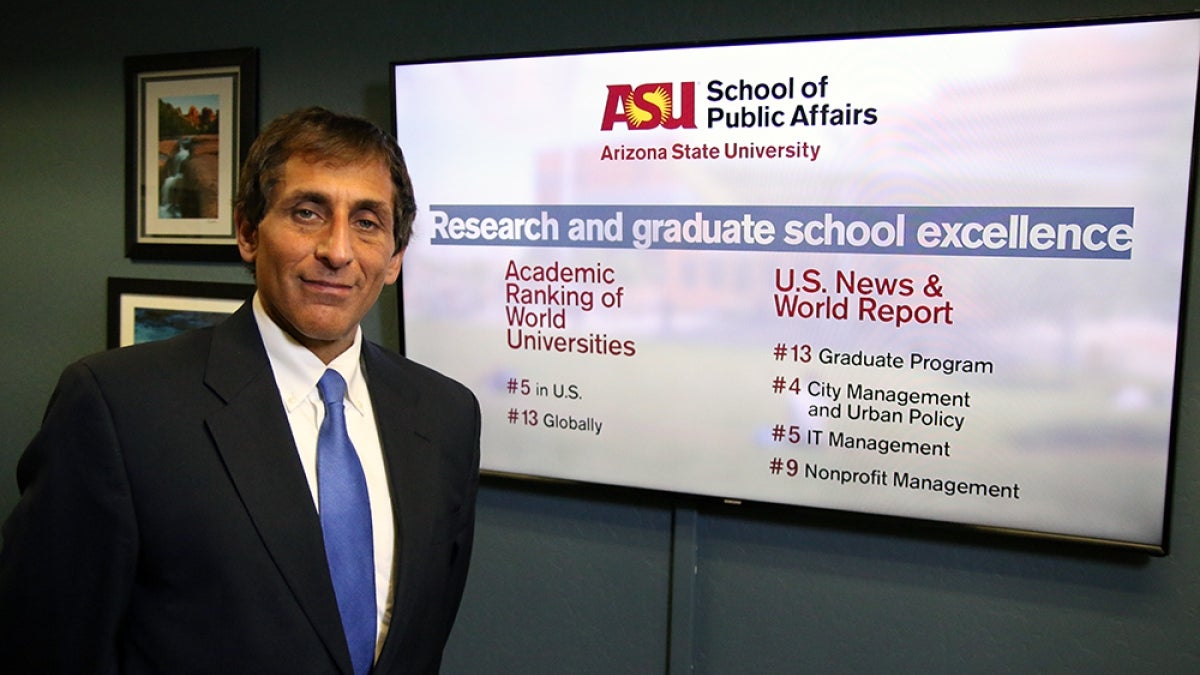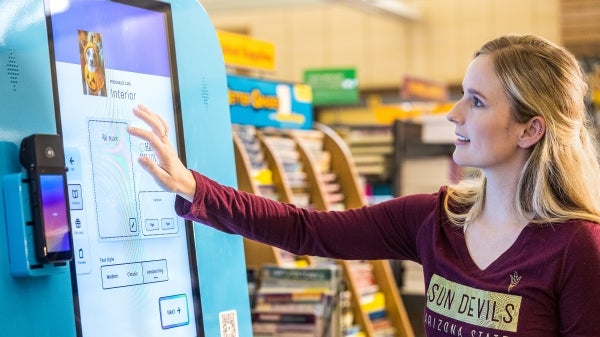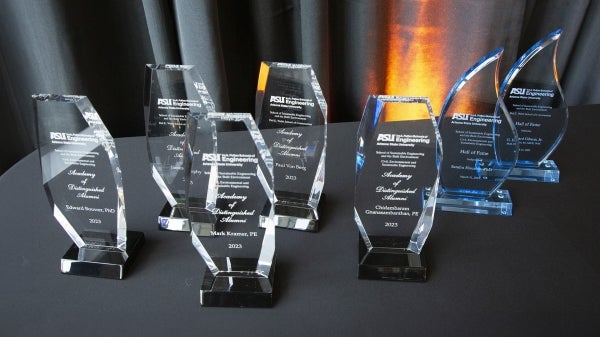Former UAlbany business dean assumes leadership of ASU School of Public Affairs

Donald Siegel is the new director of the ASU School of Public Affairs in downtown Phoenix.
Donald Siegel is the new director of the School of Public Affairs in the College of Public Service and Community Solutions at Arizona State University. He replaces Karen Mossberger, who remains a professor and is working on two books and other projects that she had put on hold.
Siegel is quick with a smile and direct with his words.
“Like another New Yorker with the same first name, subtlety is not a strong point, OK?” chuckles the Brooklyn native. “So I'm going to be blunt.”
With more than 900 undergraduate and graduate students, Siegel assumes the leadership of one of the top-ranked schools in the world for public administration research and graduate education.
“This is a great school and I'm honored to be representing it,” Siegel said. “I will work tirelessly to promote and advance the goals of the school and to enhance the return on investment in the ASU degree.”
Siegel is no stranger to Arizona State University and downtown Phoenix. He was an economics professor at the ASU West campus and taught MBA classes at the ASU Mercado campus off Van Buren and 7th Street.
“I was down here at the end of 1999 and downtown Phoenix was a ghost town,” he recalled. “But now, with more than 12,000 students, it’s a living example of President Crow’s vision for the university as an engine of economic and social development.”
An accomplished researcher, administrator and journal editor, Siegel joins ASU from the University at Albany, SUNY where he was a professor of management and dean of the School of Business for eight years. Siegel also taught and served in administrative roles at Stony Brook University, Rensselaer Polytechnic Institute, Nottingham University, and the University of California, Riverside. In 2016, Siegel was elected a Fellow of the Academy of Management, an honor bestowed on less than one percent of the Academy’s 21,000 members, for his significant contributions to the science and practice of management.
Under Siegel’s leadership, the business school at UAlbany was awarded more than $13 million in research grants and received $21.4 million in gifts and donations, including the naming of its $54 Million building, which was ranked #4 in the world. During his tenure as dean, the school also developed New York state’s first undergraduate degree program in digital forensics, new undergraduate and graduate programs in entrepreneurship and cyber security, and an award-winning, community-based social entrepreneurship program with the School of Social Welfare. The school was also ranked #1 in the nation for three years in a row by U.S. News & World Report for MBA job placement.
“Don is exactly the kind of experienced leader and accomplished scholar we need,” said Jonathan Koppell, dean of the College of Public Service and Community Solutions and a former director of the School of Public Affairs. “His achievements running a business school strengthens the program and his scholarship adds to the national reputation of our faculty.”
The ASU School of Public Affairs ranks No. 5 in the U.S. and No. 13 in the world for research, according to Shanghai Ranking Consultancy's Academic Ranking of World Universities. In 2016, U.S. News & World Report ranked its graduate programs No. 13 in the country, tied with such elite private institutions as Columbia, Duke, Carnegie-Mellon, and the University of Chicago. The school did even better in specialized ratings. U.S. News ranked the School of Public Affairs as No. 4 in the nation in city management and urban policy, No. 5 in information and technology management, and in the top 11 for environmental policy and management, nonprofit management, public finance and budgeting, and public management administration.
The school is home to ten research centers and initiatives including the Center for Policy Informatics, the Center for Urban Innovation, and the Center for Science Technology and Environmental Policy Studies. Another, the Center for Organization Research and Design, recently launched an outreach campaign to promote its work on local government sustainable purchasing policies and practices.
“ASU’s School of Public Affairs is ranked among the best schools in the world because our faculty are world-renowned experts in their fields,” Siegel said. “We also have several research centers that conduct a substantial amount of funded research, generating numerous top-tier publications and highly-influential reports for federal and state agencies. Our centers significantly add to the luster and reputation of the school.”
In addition to his administrative duties, Siegel will continue his own funded and scholarly research, including two recent NSF grants, which focuses on university technology transfer, entrepreneurship, and social responsibility.
Siegel has published 12 books and 112 journal articles in leading journals in economics and management. His citation count, according to Google Scholar, is 32,562, with an h-index of 68. Siegel is an editor of the Journal of Management Studies and the Journal of Technology Transfer, an associate editor of the Journal of Productivity Analysis. He also serves on the editorial boards of Academy of Management Perspectives, Academy of Management Review, Academy of Management Learning & Education, Journal of Business Venturing, Corporate Governance: An International Review, Strategic Entrepreneurship Journal and the British Journal of Management. He has also co-edited 46 special issues of leading journals in economics and management.
Staying active as a researcher and an editor is important to Siegel.
“I think this sends an important signal to the faculty that ‘OK, this guy is an administrator, but he hasn't gone over to the dark side. He understands what we go through and the constraints that we have on our time. He's in the game.”
A priority for Siegel is student success. Many students in the School of Public Affairs are the first in their families to attend college, which can be difficult for students with limited resources. Raising money for scholarships will be an important part of Siegel's job.
“A very high proportion of our students work while attending school,” Siegel noted. “These students deserve a lot of financial support and we're going to try to provide that.”
Siegel plans to develop stronger connections between the school and government, nonprofits, and the business community in downtown Phoenix. He wants these institutions to partner more with the school and its outstanding students and faculty.
“A trend that I have observed is that many workers are transitioning across sectors. A concomitant trend is a substantial rise in the volume of interactions between public and private sectors,” Siegel noted. “Thus, even someone who works in the public sector needs to understand the private sector and someone working in the private sector needs to know how to interact with the public sector.”
Siegel wants to collaborate with other ASU schools and outside organizations to ensure students graduate with the knowledge and skills needed in a fast-changing workplace. First up, a new undergraduate concentration focusing on government/public procurement developed by professor Nicole Darnall.
“This week, we met with the Department of Supply Chain Management in the W.P. Carey School of Business to see if we can establish a new undergraduate concentration in public procurement,” Siegel said. “Our hope is that by collaborating with one of the best programs in the country we can help meet the strong demand for graduates who understand how to do purchasing and deal with suppliers in the public sector.”
In January, the School of Public Affairs will welcome its first cohort of executive MPA students. Aimed at mid-level public managers, the online graduate program will feature in-person sessions in Phoenix and Washington, D.C. Classes will be taught by professors with specific expertise from the school, the Thunderbird School of Global Management, the W. P. Carey School of Business and the McCain Institute for International Leadership.
Reaching out to alumni is another important step for Siegel. He hopes to better engage past graduates in the hope of raising the school’s profile and increasing opportunities for alumni and current students.
“Our students have made a substantial investment in time, money, and effort in securing an ASU degree," Siegel said. "We want to make sure that the return on investment is high and we're going to try to maximize that.”
More Business and entrepreneurship

Thunderbird at ASU, W. P. Carey School team up on concurrent master's degrees
Students are now able to take advantage of two world-class schools at Arizona State University, at the same time. The…

ASU alum's personalized greeting card kiosk debuts on Tempe campus
Everyone knows how disheartening it is to dash into a store to grab a last-minute holiday card and find the selection picked over…

Celebrating industry giants and distinguished alumni
Four outstanding alumni and two industry leaders will be honored at the School of Sustainable Engineering and the Built…